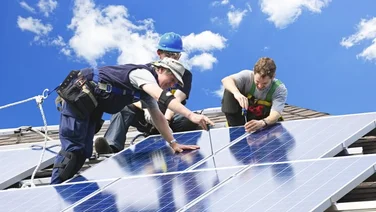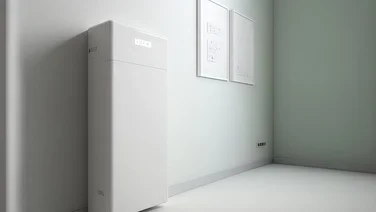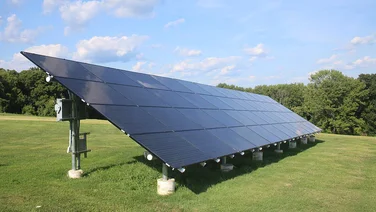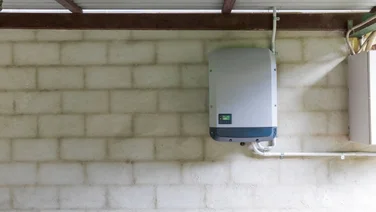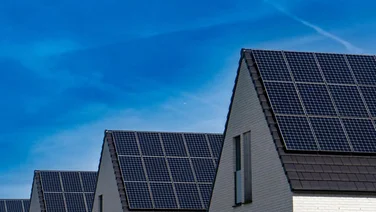- Are solar panels worth getting?
- The pros and cons of solar panels
- How much do solar panels cost?
- When will you break even on your solar panels?
- Does location affect when you break even on solar panels?
- Does property size affect when you break even on solar panels?
- The factors that affect the break-even point
- Is your property suitable for solar panels?
- Will solar panels become a better investment in the future?
- Do solar panels increase your property’s value?
- Next steps
- FAQs
- You’ll break even on solar panels in 15.66 years, on average
- Solar panels will typically cut your electricity bills by 70%
- House prices increase by 0.9% to 2% with solar panels

Solar panel costs make them absolutely worth it in the UK.
And with over 1.3 million UK households making the switch to solar (according to MCS data), there’s never been a better time to join them.
So if you’re ready to get solar panels, we can also help you to compare solar panel prices. Just provide a few quick details, and our expert installers will be in touch with obligation-free quotes for you to compare.
Where do you want to install solar panels?
Get startedAre solar panels worth getting?
Yes, solar panels are absolutely worth getting. They’ll cut your energy bills, shrink your carbon emissions, and reduce your reliance on the grid.
The average household will break even on domestic solar panels in 15.66 years.
That’s because despite our often cloudy weather, solar panels in the UK still receive enough sunlight to cut your electricity bill by around 50%, even if you have solar panels in Scotland.
And if you sell your home before you’ve broken even, you’ll receive 0.9% to 2% more for your property than you would without solar panels, on average.
Is your home suitable for solar panels?
Your home will be suitable for solar panels if your meet some of the following requirements:
Adequate roof space – You’ll need enough space on your roof to place the number of solar panels required to power your home. As a general rule, it’s two square metres (m2) per panel.
So if one panel is 400 watts (W), and your home uses 8 kilowatt hours (kWh) per day, you’ll need 20 solar panels, and 40m2 of roof space to meet your needs.
Space in the attic/loft – Solar panels require inverters to convert the solar energy into usable electricity. An inverter is roughly the size of a microwave, so as long as you have space for that you’ll be good.
Strong enough roof – Although most roofs will be more than capable of holding a solar panel system, it’s still worth checking its structural integrity. Generally speaking, if your roof is less than 15 years old, you’ll have no trouble installing solar panels at all.
These are the must-haves for solar panels, but you should also think about whether your home has ideal conditions for solar panels, in order to get the most out of your system:
South-facing roof – Having a south-facing roof is ideal for solar panels because it means they’ll be exposed to the sun for longer periods of time. You can get away with solar panels on east, west, or even north-facing roofs, but you won’t be able to generate as much power (read more: north vs south facing solar panels).
Pitched roof – You’ll want a roof pitched between 30° and 45° to make the most of the sun as it travels across the sky. If your roof is flat, your solar panels will be installed on brackets that tilt them at the optimal angle.
Unshaded roof – It might seem obvious, but the less shading you have on your roof, the better your solar panels will work. Be conscious of things like trees stopping that all-important sunlight from hitting your roof.
The pros and cons of solar panels
- You save money on your energy bills
- You can sell excess electricity via the Smart Export Guarantee (SEG)
- You’ll shrink your carbon emissions
- You’re less reliant on the grid
- Solar panels are low maintenance
- Grants can reduce the cost
- Solar panels have a high upfront cost
- You’ll generate less electricity in cloudy weather
- Solar panels take up a lot of space
- You will need an expensive storage battery to store electricity for use at night
- It takes over a decade to break even
The pros of solar panels are immense, and if you can afford the upfront cost they are absolutely worth getting. With solar panels, the average three-bedroom home will save £454 a year on their energy bills.
And if you’re exporting excess electricity to the grid via the SEG, you’ll make an additional £160 per year. All that while shrinking your carbon emissions to make the world a greener place to live.
Solar panels do take up a lot of space though, so if you don’t have enough roof space to power your home, you’ll still be reliant on the grid. You’ll be reducing your grid reliance overall however, which is only ever a good thing.
You’ll also only be able to generate electricity during the day, so if you want to store solar energy to use at night, you’ll have to purchase a storage battery. These typically cost £4,500 and as they last an average of 12.5 years, you’ll purchase two within the typical lifespan of a solar panel system.
Read our complete guide on the pros and cons of solar panels for a more detailed look.
How much do solar panels cost?
Solar panels cost £703 per panel, on average, for a typical 350-watt panel (which is the average solar panel power output rating).
The typical three-bedroom house will need 10 solar panels, which means a total cost of £7,026.
When will you break even on your solar panels?
| Cost of electricity | Years to break even on solar panels |
|---|---|
50% drop | 29 |
Current rate (24.50p per kWh) | 15.66 |
50% rise | 7.3 |
You’ll break even on your solar panels after 15.66 years, according to our latest calculations.
That figure is based on a house that receives the average amount of sunshine in the UK, uses the average electricity rate, and uses the best Smart Export Guarantee (SEG) rate.
This relatively quick return on investment shows that the golden era of solar power is here.
The cost of solar panels has fallen by 82% since 2010, and just at the right time.
Household electricity bills are rising rapidly – making it even better to use free solar power instead – and with the SEG, you’ll typically be paid 12p per kWh for all the solar energy you don’t use.
You can learn more about this by visiting our page Is Now A Good Time To Get Solar Panels?
Where do you want to install solar panels?
Get startedHow much money can you earn with solar panels?
You can make money with solar panels, but it’s not much and shouldn’t be the sole motivation behind getting a system. But if you’re generating excess electricity you’re not using, you might as well sell it.
You’ll do this with the Smart Export Guarantee (SEG), an initiative that requires electricity suppliers to pay small-scale low-carbon generators (you) a fee for each unit of electricity exported to the grid.
The current best SEG available to UK customers is 12p per kWh, which’ll net the average three-bedroom household with a 3.5 kilowatt peak (kWp) solar panel system around £160 per year.
That all adds up to a 70% saving on your annual electricity bill, on average – well above the 49% saving you’ll make without using an SEG tariff.
How much money do you save with solar panels?
Your solar panels will generate electricity you can use at home, allowing you to buy less electricity from the grid – 50% less, on average.
This will typically save you hundreds of pounds per year, and it gets even better.
The table below shows energy bill savings as well as SEG income.
Property size | Annual savings |
|---|---|
1-2 bedrooms | £272.67 |
3 bedrooms | £454.45 |
4+ bedrooms | £636.23 |
Every week, you’ll generate solar energy you don’t manage to use (even if you have a solar battery) – but it won’t go to waste if you use an SEG tariff.
After 15.66 years, your savings will typically exceed the amount you paid for your solar panels, meaning you’ve hit the break-even point.
If you want to see how we worked out all of these figures, check out our methodology at the bottom of the page.
How big is your solar panel system, and how roughly much did it cost?
“We have an 18-panel system plus battery. The system is 6 kW and it cost us £8,453 including installation.”
Do your solar panels cover all of your electricity needs?
“When it’s sunny, we don’t need to use electricity from the grid at all. We only fall back on the grid when the weather is particularly bad and/or our solar battery doesn’t have enough power stored. This is rare, though.”
How much money do your solar panels save you on your electricity bills?
“I would say on a daily basis we are hardly using grid electricity. Every day it’s sunny, it’s basically free, but it’s hard to know exactly.”
Tilly lives in Farnham, Surrey, and she has owned solar panels since November 2021
Does location affect when you break even on solar panels?
Yes, your location affects your break-even point on solar panels.
The sun shines more in different regions of the UK, so solar arrays in certain areas will generate more energy.
It therefore makes sense that all the regions would have different break-even points – all of which you can see below.
| Region | Years to break even |
|---|---|
South Wales | 12.4 |
South West England | 12.4 |
South East England | 13 |
South England | 13 |
East Anglia | 13.03 |
North Wales | 14.3 |
North West England | 14.3 |
Midlands | 14.8 |
Northern Ireland | 9.7 |
East England | 15.01 |
North East England | 15.01 |
East Scotland | 16.04 |
West Scotland | 16.2 |
North Scotland | 17.7 |
Does property size affect when you break even on solar panels?
The size of your home will not affect your break-even point, as long as you get an appropriately sized solar panel system.
The average three-bedroom house will need 10 panels, a small house usually requires six panels, and a large house typically needs 14 panels – but in all of these cases, they’ll break even after 15.66 years.
On the other hand, location makes a tremendous difference, as you can see in the examples below. Solar panels in London receive much more sunshine than solar panels in Glasgow, so they have a lower break-even point.
For more information, check out our guide, How Many Solar Panels Do I Need?
Example: a three-bedroom house in London
| Cost | No. of panels | Solar energy produced | Total yearly savings | Break-even point |
|---|---|---|---|---|
£7,659 | 10 | 2,762kWh per year | £504 | 15.2 |
Example: a five-bedroom house in Glasgow
| Cost | No. of panels | Solar energy produced | Total yearly savings | Break-even point |
|---|---|---|---|---|
£10,067 | 14 | 3,339 kWh per year | £609 | 16.5 |
The factors that affect the break-even point
Let’s jump into more detail about everything that influences your return on investment when it comes to solar panels.
Location
The number of hours every year when the sun is shining varies across the country, as you’ll know if you’ve spent any time living in different parts of these isles.
This directly impacts the amount of power you can generate. For instance, households in North Scotland receive 1,080 hours of sunlight every year, where as the lucky souls in East Anglia enjoy 1,570 hours, according to the Met Office.
That’s 45% more sunshine – a massive difference.
Smart Export Guarantee rate
The Smart Export Guarantee compels large suppliers to pay households for the renewable energy they export to the National Grid.
That means you can receive money for all the solar energy you don’t use – which is 50%, on average.
However, different suppliers offer different rates, ranging from E Energy’s extremely low 1p per kWh to Octopus’s Intelligent Octopus Flux tariff, which will earn you about 29.3p per kWh.
Make sure you get on the highest rate possible, because the Smart Export Guarantee will save you £160 per year, on average.
Did you know?
The best Smart Export Guarantee rate available to all customers is ScottishPower’s SmartGen tariff, which pays 12p per kWh.
Solar battery
It’s even more profitable to use your solar energy than to sell it for Smart Export Guarantee payments – and that’s where solar batteries come in.
A solar battery can help you to use 30% more of your solar energy, according to E.ON.
That will save the typical three-bedroom household an extra £132 per year. A solar battery typically costs £4,500, which ends up delaying the break-even point for your solar array to 20 years, on average.
However, a solar battery also reduces your greenhouse gas emissions by 18 tonnes, as well as increasing your energy independence.
Your electricity usage
The more electricity your household uses while the sun is shining, the more solar power you’ll use, and the more you’ll save by not getting energy from the National Grid.
However, if you don’t have a solar battery and only use electricity at night, you may end up saving less money every year through your solar panels.
If you have smart controls, you’ll be able to make sure appliances like your washing machine, dishwasher, and electric vehicle only charge using solar power, which helps a great deal.
The price of electricity
Buying electricity from the National Grid at its current rate is very expensive, so you’ll save even more money by using free solar energy than you would have a few years ago.
Instead of paying £773 per year for electricity, the average three-bedroom house with solar panels will pay £231.10– a saving of 70%.
As the cost of National Grid electricity continues to rise, you’ll save even more in the future.

Is your property suitable for solar panels?
Most properties in the UK are suitable for solar panels.
Just make sure your roof isn’t north-facing, or you won’t receive enough sunlight to make solar panels a good investment.
You also don’t want your roof to be completely in shade, for the same reason.
And you may run into difficulties if your home is a listed building.
Otherwise, as long as you own your home – or have a landlord who’s on board – you can move ahead with installing solar panels.
Will solar panels become a better investment in the future?
Yes, because electricity will become more expensive and solar panels will get cheaper, but nevertheless, you should install solar panels today.
Your annual savings will outweigh any amount you’ll cut off the initial outlay by waiting – and here’s how.
We predict that the cost of solar panels will decrease from their present level by 24.7% by 2030, and 45% by 2040, using the most recent government data.
By 2050, you’ll be paying 59.9% less than you would if you bought solar panels today.
However, the current price of electricity is high – and it’s only rising. The cost of electricity for consumers will increase by 24% by 2030, according to the Climate Change Committee.
That means that every year you’re not using solar panels to reduce your intake from the National Grid, you’ll be paying higher and higher electricity bills.
The average three-bedroom household could save around £1,000 on the price of solar panels by waiting until 2030 – but will have paid £628 more in electric bills, and missed out on £4,145 in solar power savings.
Overall, you would lose £3,587 by waiting – and that’s without even factoring in the Smart Export Guarantee. It’s a better idea to buy solar panels now, and start saving money straight away.
Do solar panels increase your property’s value?
Solar panels do increase your home’s value – and with energy bills and the climate crisis on the rise, that’s no surprise.
They save you money, they barely require any maintenance, and they can boost your home’s Energy Performance Certificate (EPC) rating by up to two grades.
Maybe that’s why 65% of people told our latest National Home Energy Survey that they would buy a house with solar panels.
For more information, read our article explaining how solar panels affect your property’s value.
How we worked it out
We’ve calculated the total cost of the average solar array, factored in the money you’ll save on electricity from the National Grid, and added your SEG savings.
The result? Install solar panels today, and you’ll break even in 15.66 years, on average.
It may take you even less time to break even, considering we expect the price of electricity to stay high for at least the next two years.
Since the typical solar panel warranty lasts 25 years, this will leave you with at least 10 years to save even more money with your panels – and many solar arrays last well beyond 25 years.
In percentage terms, this rate of return is the same whatever the size of your house. The graph shows this clearly, as your expenses stay stable and your annual savings climb, allowing you to break even before 2034.
However, a bigger outlay on a larger system can lead to higher profits.
You’ll typically end up making a profit of £2,601 on a solar array for a one or two-bedroom house, a £4,335 profit if your home has three bedrooms, and an £6.069 profit on an array for four bedrooms.
Methodology
1. From our research, we found that the average solar panel has a rating of 350 W.
2. The average 3.5 kWp system costs £7,026, according to the Energy Saving Trust, so it follows that one 350 W panel costs £703 (inclusive of installation costs).
3. We also discovered that the average solar panel is able to produce 85.25% of its potential output over its lifespan. This, combined with the UK’s weather, means in any given year, a 3.5 kWp system will provide you with 2,645 kWh per year, on average.
4. The average household won’t use all of that energy, however, as most people don’t stay home all day. When the government used to offer an export tariff, it assumed you export 50% of the electricity you generate, so we’ve used that figure.
That means you’ll use half of the solar energy you generate – around 1,300 kWh – and the other 1,300 kWh will earn you money through the Smart Export Guarantee scheme.
5. This will save you a considerable amount of money on energy bills, but exactly how much depends largely on the size of your home.
According to Ofgem, the average house with one or two bedrooms uses 1,800 kWh per year, a home with three bedrooms uses 2,700 kWh, and a house with four bedrooms or more uses 4,100 kWh.
6. We multiplied each of these figures by the average price of electricity in the UK, which is 27.35p per kWh, according to the Energy Saving Trust, to find out how much each household would pay in electricity bills every year, and how much they’d save by using solar energy.
The average three-bedroom house, for instance, would typically pay £738 per year for its 2,700 kWh – but with a 3.5 kW solar array producing around 1,300 kWh of energy the household uses, the occupants would save £537 per year.
7. We assumed that households would choose the highest Smart Export Guarantee rate currently on the market that doesn’t require you to switch suppliers.
We then multiplied that rate of 12p per kWh, from Scottish Power, by the electricity each home sends back to the grid. For example, the average three-bedroom house makes £159 per year from the SEG, by exporting 1,300 kWh – half of its solar energy.
8. We didn’t include any maintenance costs in our calculations. If you’re capable of cleaning your solar panels once per year, that makes it free, and the main expense – replacing your solar inverter – is falling all the time.
Inverters’ prices should continue to plummet in response to the continual decline of home solar panel prices – which have dropped by 50% since 2011, according to the government – plus the cost of electricity is consistently going up. We think these trends will cancel each other out.
Next steps
The best next step is to check your annual electricity usage, assess your roof space, and work out how many panels and how much solar energy you want to generate per year.
If you ask a solar professional to perform these tasks for you, you’ll be able to rely on the results – but make sure you get a few different assessments and quotes.
To find out how much it would cost you to install solar panels, fill in our quick form and you’ll receive free solar panel quotes from local, professional installers.
FAQs
Are solar panels worth it?
Solar panels are definitely worth it in the UK.
The average three-bedroom household will save 70% on its electricity bills by going solar, and break even on the cost of its panels after just 15.66 years.
It’s a large upfront cost – but if you can afford it, solar panels make an excellent investment.
What are the two main disadvantages to solar energy?
The main disadvantage to solar energy is the initial cost.
The average solar panel costs £703 to buy and install, meaning a set of 10 panels for a three-bedroom household will cost £7,026.
The other disadvantage is that once the sun goes down, you won’t be able to use your panels – meaning you’ll still need grid electricity or a solar battery.
Do solar panels devalue your house?
Multiple studies have shown that solar panels increase your home’s value, rather than devaluing it.
The most recent UK study revealed that buyers will pay an extra 14%, on average, if a property comes with solar panels.
For the average household, this will mean a price rise of more than £40,000.
Why is solar not more popular?
The upfront cost of solar panels and limited support given by the government are the main reasons why solar isn’t more popular.
It’s also difficult to reassure homeowners to part with thousands of pounds for a product that has only become profitable in the past decade or so.
However, the tide is turning. Installations have grown by 45% in the past three years, in response to spiralling electricity costs and the increased quality of panels.


